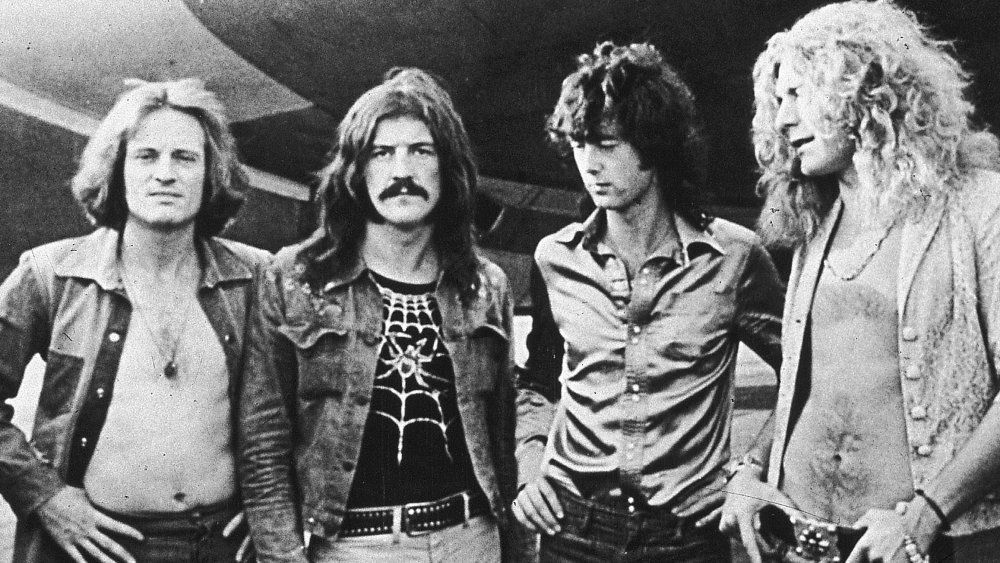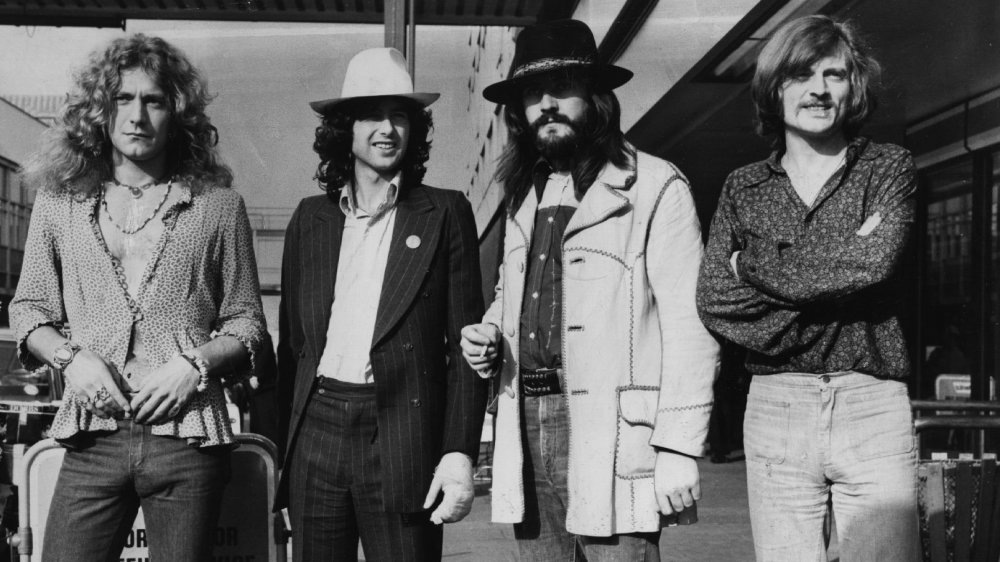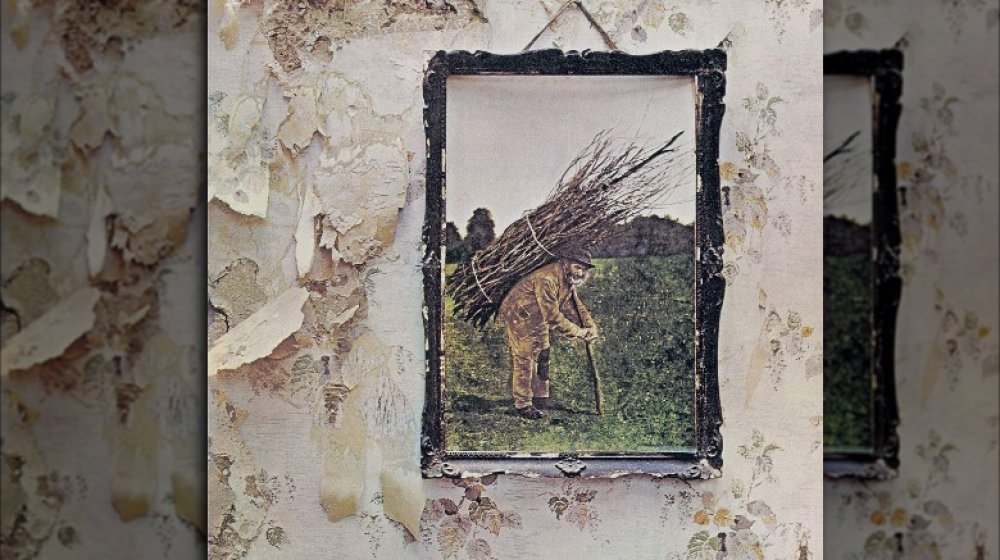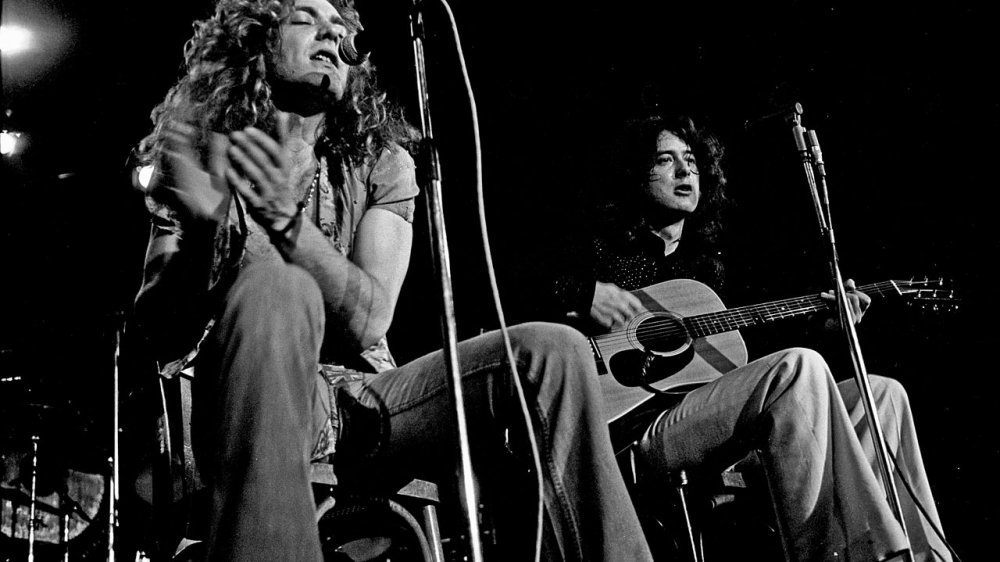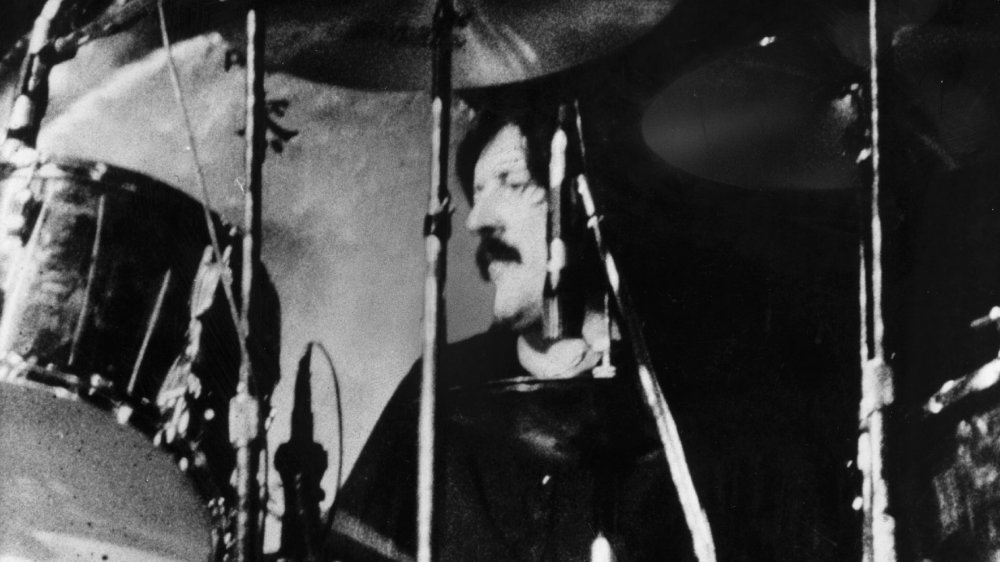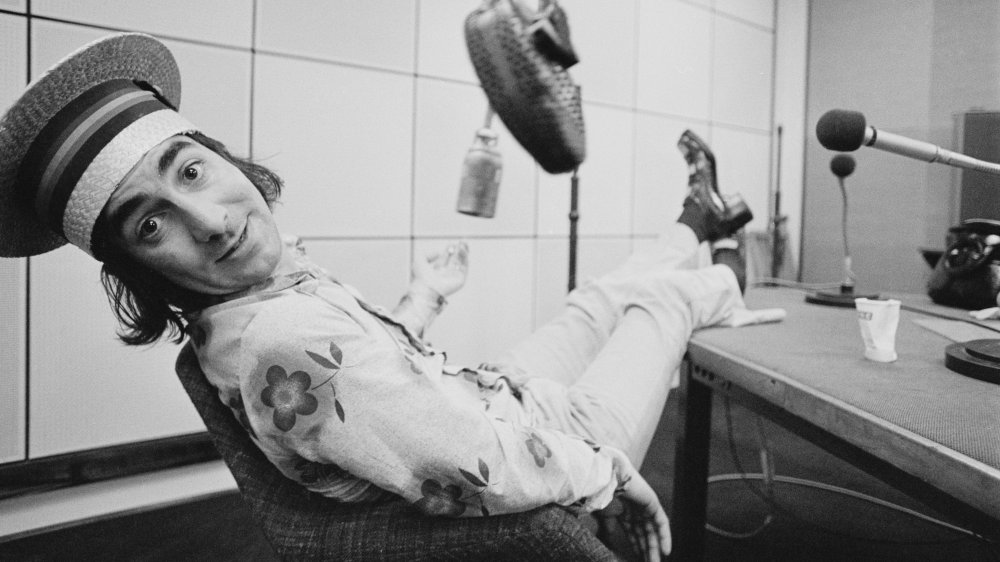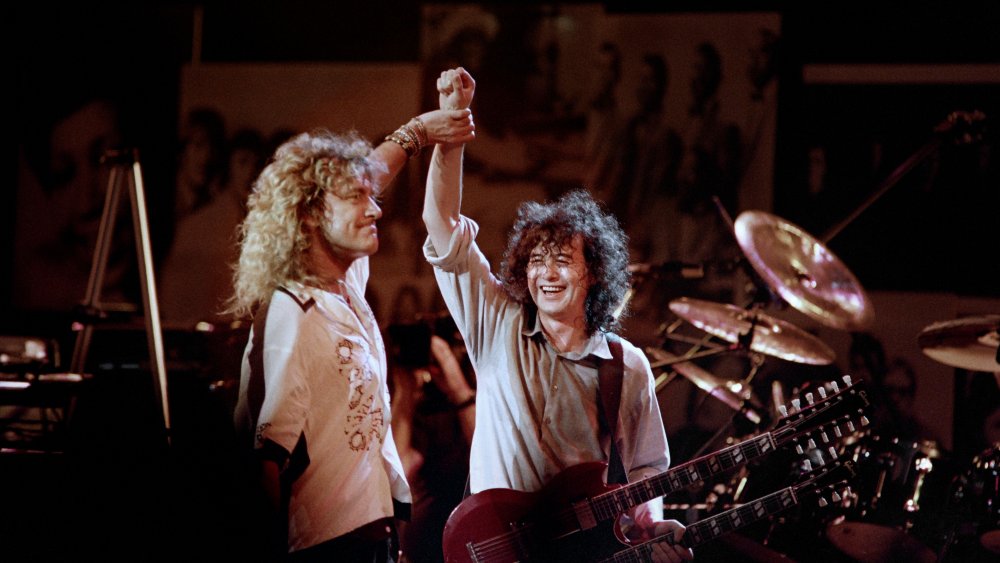False Things You Believe About Led Zeppelin
More than 50 years after their debut, the band Led Zeppelin has become equal parts music and myth. This is in part due to the band's self-conscious branding. The members of the group were marketing geniuses, and they all knew the mystique of their band was a powerful selling point. This was doubly so in those harsh times before the internet came along to allow entire careers to launch, peak, and collapse in the space of a few hours.
As a result, there are few bands from classic rock's heyday so clouded by legend, folklore, and rumors that have zero basis in fact. In fact, there's a very good chance that you believe at least one false thing about Led Zeppelin no matter how much of a megafan you might be. When you carve out a public image that's as larger-than-life as Zeppelin's, the line between fact and fiction gets blurry fast, and these inaccurate stories have persisted for years.
Led Zeppelin and the mud shark incident
If you've heard of Led Zeppelin, you've heard of the notorious mud shark incident. It's easily the most infamous story of rock 'n' roll decadence in history. There are many conflicting versions of the event, but the basics are pretty consistent. In a hotel room with a female fan, the band engaged in some extremely unusual and "intimate" activities involving a fish (as one does). It's the sort of outlandish and horrible story that seems to fit right in with Led Zeppelin's reputation. After all, the band wasn't known for its early bedtimes and regular Bible study gatherings. However, some versions of the story claim the girl involved wasn't a voluntary participant, and Led Zeppelin's interest in the occult usually adds a shade of darkness to the tale as well.
The problem, as pointed out by Snopes (among many other places) is the sheer number of versions of the story. According to Snopes, the band's road manager, Richard Cole, claims it was him wielding the shark (which he and drummer John Bonham had caught in a nearby river) and that the woman involved was an enthusiastic participant. And in his autobiography, Vanilla Fudge drummer Carmine Appice also takes responsibility, saying he, his road manager, Cole, and Bonham were all involved but not the rest of Zeppelin. In the end, there are just too many contradictions to buy this one.
The band members were Satanists
One of the most persistent rumors swirling around Led Zeppelin is their supposed Satanism, including the rumor that they sold their souls in exchange for their immense success. This rumor was inspired by three things: lead guitarist Jimmy Page's interest in the occult (and specifically Aleister Crowley, a famous occultist often called a Satanist), the band's refusal to ever issue any sort of official denial (likely recognizing that the rumors actually helped sales), and the crazy idea that there were backwards messages extolling Satan hidden in their songs (most notably in "Stairway to Heaven").
The band's image didn't help, either. Between Page's obsession with witchcraft and singer Robert Plant's fascination with The Lord of the Rings — not to mention their notoriously hard-driving rock 'n' roll lifestyle in the early 1970s — Satanism didn't seem so far fetched. But while Page's personal philosophy lined up with Crowley's "do what thou wilt" mantra (in fact, he had this inscribed in the run-off groove of their album Led Zeppelin III), Crowley himself wasn't actually a Satanist, and there's zero evidence that Page — or anyone else in the band — was.
Led Zeppelin's secret backwards messages
Led Zeppelin certainly isn't the only band rumored to have embedded secret backwards messages in their songs, a technique known as backward masking, but they're pretty closely associated with the alleged activity. While rumors of Satanism and other occult practices swirled around the band almost since their inception, the idea that they were using these backwards messages to subliminally influence their impressionable teenage fans became widespread in the early 1980s when an anti-rock televangelist named Paul Crouch began talking about it. The most famous example is in "Stairway to Heaven." Supposedly, if you play an early part of the song backwards, you can hear Plant singing lines that begin "here's to my sweet Satan" ... and it sure does sound like that when you play it backwards.
Kind of. If you use your imagination, which, as Salon explains, is the point.
See, there are various psychological reasons we think we hear something coherent in what is clearly a slur of backwards sound. First and foremost, we're primed to listen intently for the phrase we've been told is there. Second is the concept of "phonetic reversal," wherein the sounds we piece together to form words, called phonemes, can clump into patterns that sound like words when reversed. But, as Robert Plant told Rolling Stone, "Who on Earth would have ever thought of doing that?"
Led Zeppelin's fourth album has a title
By the time Led Zeppelin released its fourth album in 1971, it was arguably the biggest band in the world. Their combination of heavy guitars, blues-influenced rock, and extreme technical capabilities had made them hugely popular, and the album remains the best-selling record in their catalog. After all, it contains both "Black Dog" and "Stairway to Heaven," the two Zeppelin songs that even people who hate Led Zeppelin know.
Now, you probably think the title of the album is Led Zeppelin IV or Zoso or an unpronounceable series of symbols ... but you're wrong. The album has no title at all. The album cover also doesn't identify the band in any way, and they were advised that this was "professional suicide." But as it turned out, it was the opposite. According to Rolling Stone, Jimmy Page did this in part to get back at the rock music journalists and reviewers he'd come to view as enemies due to the incessant bad press and poor reviews the band received. He figured having an untitled album would make it more difficult for them to write about. The fact that the packaging also enhanced the band's mysterious image was probably also a motivating factor.
They appeared on TV
To this day, people will swear that they saw Led Zeppelin perform on television in the 1970s, which would be news to the band. While it's true that a very, very early performance by the band in 1969 (when they were still known as the New Yardbirds) was broadcast on Danish television, and they briefly appeared that year on Japanese TV as well, the band was notorious in their refusal to do so once they were firmly established.
As radio producer and writer Alex Ashlock notes (via WBUR), Zeppelin's manager, Peter Grant, refused to allow the band to appear on television because he regarded it as a giveaway. He wanted people to buy a ticket for a concert, not see one for free in their living rooms. And yet the rumor persists because, in a way, Led Zeppelin was on TV, on a show called Don Kirshner's Rock Concert, which featured bands playing live back in the days before MTV. On September 29, 1976, the show aired footage from Zeppelin's concert movie, The Song Remains the Same. Plenty of people with murky memories of this event will swear that Zep played live, but it isn't true. The band never appeared on TV after March 1969.
'Babe, I'm Gonna Leave You' is a traditional folk song
It's easy to understand why there might be some confusion about the credits for a lot of Led Zeppelin songs. After all, the band had a bad habit of adapting old blues songs and conveniently forgetting to credit the original artists, leading to a flurry of lawsuits over the years. But if you bought a copy of their debut album, Led Zeppelin, and came away believing that their hit song "Babe, I'm Gonna Leave You" is a traditional folk song that Jimmy Page arranged, you were bamboozled.
The band first heard the song because they were huge fans of Joan Baez, and she played the song in her shows all the time. She even included it on her 1962 album Joan Baez in Concert, where she mistakenly credited it as "traditional," meaning it had no author. When Zeppelin reworked the song for their debut album, they used the same listing, crediting Page for the arrangement only. But as The Daily Beast explains, the song was actually written in the late 1950s by Anne Bredon, who drifted out of the folk music scene and was completely unaware of Zeppelin's version until a decade after it was released.
They turned down millions to reunite
Considering they were one of the biggest bands of all time and yet were only together for 12 short years, it's not surprising that a Led Zeppelin reunion is high on a lot of rock fans' wish lists. With the exception of a few live performances for charity, however, the three surviving members of the band (Jimmy Page, Robert Plant, and John Paul Jones) have never agreed to a formal reunion to either tour or record, which makes the rumor that Richard Branson offered them $800 million to get the band back together in 2014 believable enough.
The details of the rumor are little wonky. Supposedly, it would involve hundreds of concerts but only three cities, and Branson intended to use his expertise in the airline industry to recreate Zeppelin's legendary touring plane, The Starship. The rumor goes on to claim that Robert Plant — who's always shown about as much interest in reforming Led Zeppelin as he does in dental surgery — considered the offer for a night, then theatrically ripped up the contract in front of everyone the next morning. But as online music magazine Consequence of Sound reports, none of this is true. Both the band and Branson confirmed it as fake news, no doubt boosted by legions of fans thirsty for a Zeppelin comeback.
The drums on 'When the Levee Breaks' got their sound in a stairwell
Even if your musical taste ranges far, far from 1970s hard rock, you know the drums from Led Zeppelin's 1971 song "When the Levee Breaks" (a cover of an old country blues song from the 1920s). If you look up the term "epic drum sound," you're directed to a clip of this amazing ballad. The drums have an epic echo and delay to them that makes them sound absolutely massive, and other artists have been sampling the drums for decades. What you probably believe about this drum track is that Jimmy Page got that huge sound by putting John Bonham's drum set in a stairway at the drafty old cottage the band was recording in, Headley Grange, and the massive reverb is all natural, the result of the room's acoustic qualities and not any sort of effects device
Unfortunately, it's not actually true, even though there are multiple interviews where Jimmy Page (who produced the song) perpetuates the story. As music producer and educator Rick Beato explains, the recording engineer who worked on the song, Andy Johns, states flatly that they used a device called the Binson Echorec to give the drums that sound. Still, that doesn't make the track or the drumming any less incredible.
Led Zeppelin had #1 hit songs
Led Zeppelin was huge. According to Forbes, they've sold over 300 million albums. They're also one of a handful of bands that have name recognition outside their given genre and time period, and they're part of an even shorter list of bands from that era whose music is still widely played and sampled. Some of those songs are so recognizable, so embedded in pop culture, that it's easy to understand why people think they had at least one #1 song ... but they never did.
First of all, they didn't release a lot of singles because their manager, Peter Grant, wanted to force people to shell out for the entire album if they liked a song. In fact, they only released ten songs that made the Billboard charts at all. The closest to #1 they ever got was when "Whole Lotta Love" hit #4 in January 1970. For reference, the #1 song that week was "I Want You Back" by the Jackson 5, which, you know, is fair.
Their name was meant to be cool
You might think the name Led Zeppelin was meant to sound cool, but that's only because they made it cool. It was originally a joke. By the late 1960s, Jimmy Page was an established and successful musician who'd played on plenty of recordings by big name artists like the Who, the Kinks, and the Rolling Stones, and in 1966, he joined the Yardbirds with his old friend Jeff Beck. Just before that, he played guitar for a song Beck was recording as a solo artist, with Keith Moon from the Who on drums and John Paul Jones on bass. Page looked around at the talent in the room and thought about forming a "super group" of established, genius musicians. When he floated the idea, Rolling Stone reports, Moon (pictured) scoffed and suggested they could call the band Lead Zeppelin because "because it can only go down, like a lead balloon."
A few years later, Page began putting together his super group idea after the Yardbirds broke up, recruiting singer Robert Plant, Jones, and drummer John Bonham. The band originally toured Europe as the New Yardbirds as they rehearsed and perfected their performance, but according to writer Mick Wall, when they returned to America, Page got a cease-and-desist letter from Yardbirds guitarist Chris Dreja, who claimed to have the legal rights to the band name. Page remembered Moon's joke from a few years before and decided to call the band Led Zeppelin, changing the spelling because he worried people would mispronounce the first word.
They stole 'Stairway to Heaven'
You can't be blamed if you think Led Zeppelin straight-up stole the intro to "Stairway to Heaven" from a band called Spirit. For one thing, the short list of musicians Zeppelin allegedly stole from isn't exactly short. As Rolling Stone notes, the band has been successfully sued over songs such as "Dazed and Confused," "Whole Lotta Love," and "Boogie with Stu."
For another, the band's been embroiled in a lawsuit over "Stairway" since 2014 with the estate of Randy Wolfe, whose band Spirit released a song called "Taurus" in 1968, several years before "Stairway." If you listen to the two songs side by side the similarities are obvious, but the band vehemently denies being aware of "Taurus," and to be fair, in other cases where the band's been accused of borrowing elements of other songs, they've usually admitted it and expressed exasperation before eventually giving credit or settling a lawsuit.
Plus, as The Guardian reported a few years ago, music experts say both songs are using centuries-old structures and chord progressions that are being re-used to this day. In other words, Zeppelin can't be guilty of stealing this particular bit because what they're really guilty of is being very, very basic when it comes to their music composition skills, which we guess is ... better? Certainly better than paying Wolfe's estate the $55 million that Forbes estimates the song is worth.
Robert Plant didn't write anything on Led Zeppelin
Robert Plant is known for the mystical, slightly goofy lyrics he writes, but if you look at the credits for Led Zeppelin's first album, you probably think he didn't write any of the material because he has no credits whatsoever. (Modern pressings give him partial credit on "Babe, I'm Gonna Leave You" as the result of a lawsuit settlement.) But this isn't true. In fact, it's kind of impossible. As author George Case notes, the band's songwriting was very collaborative, and Plant was a very improvisational singer, so imagining he had absolutely nothing to do with the composition of the songs on the first album is kind of strange.
Plus, Plant was already a songwriter in his own right, for one thing, and he's never seemed especially shy about expressing his own creative vision. The truth is, Plant probably should've been credited as co-writer on most of the songs on that first album, but as writer Eric Schaal explains, he was still under contract with CBS records for previous projects and was thus legally prevented from being part of an Atlantic Records deal. As a result, his name was officially left off the composition credits.
